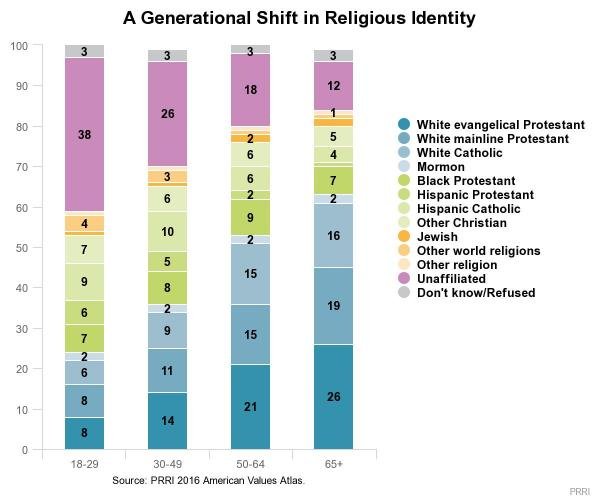
Evangelicalism is dying. Oh, Evangelicals still make lots of noise and have a stranglehold on the Republican Party, but their grip on America is weakening and, in time, their hold will falter, leading to epic collapse. The Week reports:
While 63 percent of Americans over the age of 65 are white Christians, only 24 percent of those under the age of 30 are, a group far outnumbered by the 38 percent of young adults who are unaffiliated. Unless there’s some kind of dramatic Christian awakening that produces millions of converts, that means that in the future the ranks of Christians in general and white Christians in particular are likely to shrink.
This won’t happen any time soon, but that train is a coming, and nothing can stop it. Younger Evangelicals, in particular, are exiting their churches stage left, never to return. Those who remain tend to be more liberal politically, socially, and theologically, than their parents and grandparents. These cradle Evangelicals will, in time, seek out the friendlier confines of Liberal/Progressive Christianity. The late Rachel Evans is a good example of an Evangelical who tried to change things from within, but failing to do so, left the church of her youth and became an Episcopalian.

What drives the slow death of Evangelical Christianity?
Evangelical Hatred of LGBTQ People
Evangelical hatred for LGBTQ people is well-known. See an anti-LGBTQ bill and you will find Evangelicals lurking in the shadows. Older Evangelicals lived in a world where homosexuals stayed in the closet where they belonged. Younger Evangelicals have LGBTQ friends. Exposure to people who are different from them makes it hard for them to condemn people to Hell for being “different.” The more that Evangelical young adults read, travel, and attend secular universities, the more likely it is that they will abandon the Evangelicalism of their childhoods.
Evangelical Support of Racist Immigration Policies
American Evangelicals generally support the anti-immigration policies of Donald Trump and the Republican Party. Older Evangelicals tend to live in white monocultures where exposure to non-white people is limited or non-existent. Younger Evangelicals are more likely to know and be friends with people of color. Again, exposure to people different from them forces younger Evangelicals to question the racist beliefs of their parents and grandparents.
Evangelical Support of Creationism
Most Evangelicals believe God created the universe in six twenty-four-hour days. Older Evangelicals are more likely to believe Genesis 1-3 is the de facto scientific explanation for how the universe came into existence. Younger Evangelicals, exposed to non-religious science curriculua, are less likely believe the old Evangelical canard: God Did It! They know the universe is billions of years old, and that evolution best explains the natural world. The more science training young Evangelicals receive, the more likely it is that they will cast aside creationism and its gussied-up cousin, intelligent design.
Evangelical Rhetoric on Abortion
Evangelicals are the power behind the culture war. Most younger Evangelicals grew up in churches where sermons frequently focused on this or that cultural hot-button issue. Abortion is one such issue. Younger Evangelicals are more likely to be pro-choice or support exceptions for rape, incest, fetal abnormalities, and the life of the mother. The continued war against the number one way to end abortion — birth control — is confusing and contradictory to younger Evangelicals. Not wanting to wait until marriage to have sex, many younger Evangelicals know how important the use of birth control is.
Evangelical Opposition to Same-Sex Marriage
Evangelicals stand at the forefront of opposition to same-sex marriage. Younger Evangelicals, believing you can’t help but love who you love, are less likely to have a problem with gay marriage. Again, this goes back to being exposed to people different from themselves. Many younger Evangelicals personally know same-sex couples, and these personal connections make it hard/unlikely for them to oppose same-sex marriage.
Evangelical Denial of Global Climate Change and Global Warming
Evangelicalism is front and center in the global climate change debate. Older Evangelicals, in particular, often believe climate change/global warming is a myth or something not to worry about because God is on the job. Younger Evangelicals see firsthand what violent storms, floods, melting ice caps, and rising temperatures are doing to their planet. They are angered by the “que sera, sera” approach to life of older Evangelicals; tired of “I’m going to die soon” or “the rapture is imminent” indifference from their parents, grandparents, and older church members.
Evangelical Insistence that the Bible is Inerrant
Evangelicals traditionally believe the Bible is the inspired, inerrant, infallible Word of God. Most older Evangelicals believe their Bibles are they very words of God. Many younger Evangelicals, however, have serious questions and doubts about the nature of the Biblical text. The non-answers they receive from their churches/pastors don’t measure up to their expectations. And when questions go unanswered, young Evangelicals turn to the Internet for answers, finding evidence that their pastors, parents, and Sunday school teachers are lying about the Bible These seekers wonder, “what else are our pastors lying about?”
Evangelical Support of President Donald Trump
In 2016, eighty-one percent of voting white Evangelicals voted for Donald Trump. Without their votes, Hillary Clinton would have won the election. Younger Evangelicals tended to vote for liberal/progressive candidates, candidates that better reflected their worldview. Record numbers of young Evangelicals voted for Bernie Sanders in 2016 and Barack Obama in 2008 and 2012. Younger Evangelicals see that their pastors, parents, and grandparents were willing to sacrifice moral principles to gain political power, and it disgusts them. In 2020, the party that captures this voting bloc will win the election.
Put all of these things together, and what you have is a religious sect that no longer represents younger Evangelicals; a sect that sold its soul for political expediency and power. While scores of younger Evangelicals leave Evangelicalism, never to return, others yearn for a religion that matters.
They are increasingly concluding that Evangelicalism is irredeemable, so they leave. I fully expect this exodus to increase, leading to the eventual death of Evangelical Christianity.
About Bruce Gerencser
Bruce Gerencser, 62, lives in rural Northwest Ohio with his wife of 41 years. He and his wife have six grown children and twelve grandchildren. Bruce pastored Evangelical churches for twenty-five years in Ohio, Texas, and Michigan. Bruce left the ministry in 2005, and in 2008 he left Christianity. Bruce is now a humanist and an atheist. For more information about Bruce, please read the About page.
Thank you for reading this post. Please share your thoughts in the comment section. If you are a first-time commenter, please read the commenting policy before wowing readers with your words. All first-time comments are moderated. If you would like to contact Bruce directly, please use the contact form to do so.
Donations are always appreciated. Donations on a monthly basis can be made through Patreon. One-time donations can be made through PayPal.
